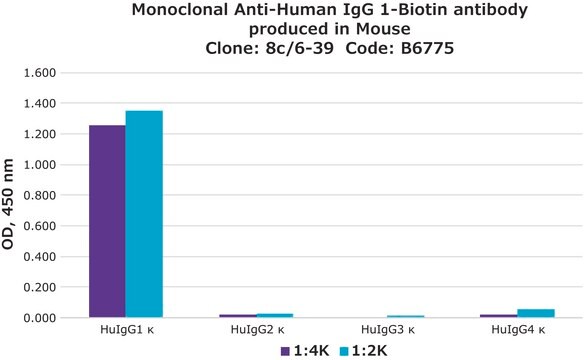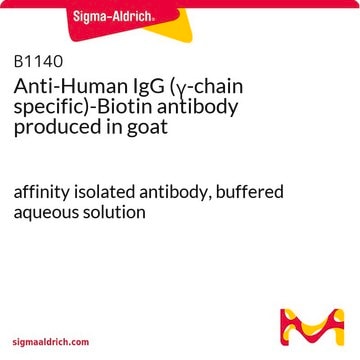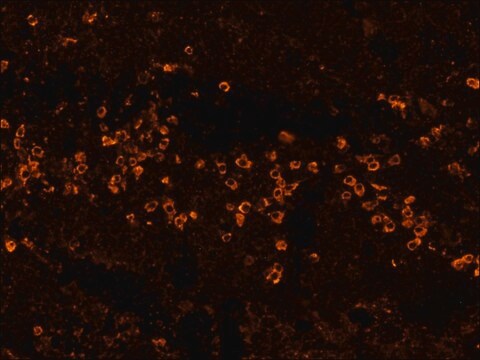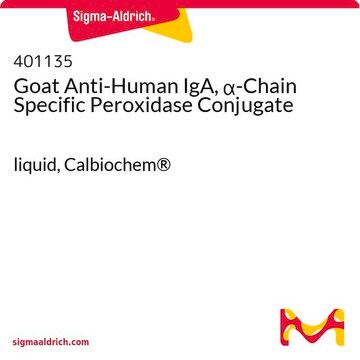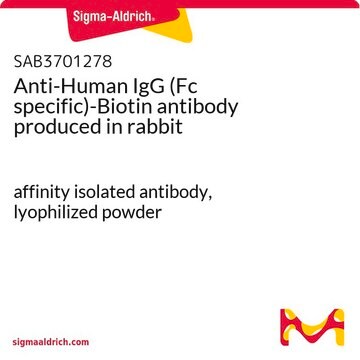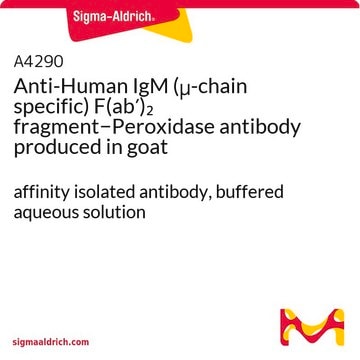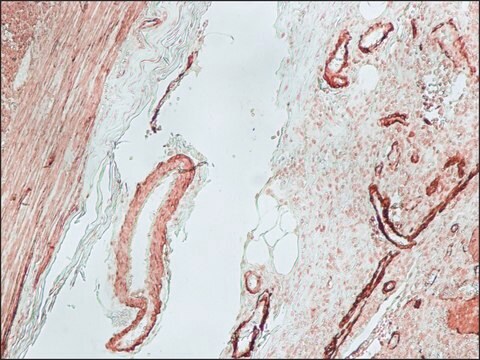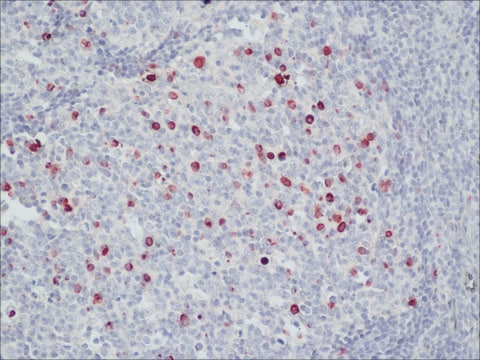B1265
Anti-Human IgM (μ-chain specific)−Biotin antibody produced in goat
affinity isolated antibody, buffered aqueous solution
Sign Into View Organizational & Contract Pricing
All Photos(1)
About This Item
Recommended Products
biological source
goat
Quality Level
conjugate
biotin conjugate
antibody form
affinity isolated antibody
antibody product type
secondary antibodies
clone
polyclonal
form
buffered aqueous solution
technique(s)
direct ELISA: 1:20,000
storage temp.
2-8°C
target post-translational modification
unmodified
General description
Human IgMs are the initial immunoglobulin isotypes that appear in blood in response to the first exposure to external antigens. IgMs have been implicated in CNS myelin repair and increased secretory IgM levels have been linked to rhino-conjunctivitis . Anti-Human IgM (μ-chain specific)-Biotin antibody is specific for human IgM and does not bind other human immunoglobulins.
IgM antibody is produced by B cells and plays a pivotal role in primary defence mechanism. The main function is to recognise and eliminate foreign invaders like bacteria and viruses, cellular waste as well as precancerous and cancerous lesions. Anti-human IgM (μ-chain specific) −biotin antibody can be used in micro ELISA to determine IgD isotype antibody to phosphorylcholine (PC) . Goat anti-human IgM antibodies react specifically with human IgM but not with other human immunoglobulins.
Immunogen
Purified human IgM
Purified human IgM.
Application
Anti-Human IgM (μ-chain specific)-Biotin antibody is suitable for use in ELISA (1:2000) .
Physical form
Solution in 0.01 M phosphate buffered saline, pH 7.4, containing 1% bovine serum albumin and 15 mM sodium azide
Disclaimer
Unless otherwise stated in our catalog or other company documentation accompanying the product(s), our products are intended for research use only and are not to be used for any other purpose, which includes but is not limited to, unauthorized commercial uses, in vitro diagnostic uses, ex vivo or in vivo therapeutic uses or any type of consumption or application to humans or animals.
Not finding the right product?
Try our Product Selector Tool.
Storage Class Code
10 - Combustible liquids
WGK
nwg
Flash Point(F)
Not applicable
Flash Point(C)
Not applicable
Certificates of Analysis (COA)
Search for Certificates of Analysis (COA) by entering the products Lot/Batch Number. Lot and Batch Numbers can be found on a product’s label following the words ‘Lot’ or ‘Batch’.
Already Own This Product?
Find documentation for the products that you have recently purchased in the Document Library.
Customers Also Viewed
R Tisch et al.
Proceedings of the National Academy of Sciences of the United States of America, 85(18), 6914-6918 (1988-09-01)
Crosslinked IgM molecules expressed on the surface of immature B cells mediate responses that inhibit further development, in contrast to the activational and proliferative events that follow crosslinking of the mu heavy chain in mature B cells. Concomitant with this
A Ripamonti et al.
Proceedings of the National Academy of Sciences of the United States of America, 114(48), 12797-12802 (2017-11-15)
Follicular helper T cells (TFHs) are a key component of adaptive immune responses as they help antibody production by B cells. Differentiation and function of TFH cells are controlled by the master gene BCL6, but it is largely unclear how
Charu Aggarwal et al.
Journal of virology, 95(23), e0061021-e0061021 (2021-09-16)
Plasmablasts represent a specialized class of antibody-secreting effector B cells that transiently appear in blood circulation following infection or vaccination. The expansion of these cells generally tends to be massive in patients with systemic infections such as dengue or Ebola
Miguel A Trujillo et al.
DNA and cell biology, 22(8), 513-523 (2003-10-21)
We examined the role of BCR cell membrane redistribution in anti-IgM-induced apoptosis in three human B cell lines, RA#1, 2G6, and MC116, that differ in their relative levels of sIgM expression. The apoptotic response was found to be dependent on
S D Litwin et al.
European journal of immunology, 17(4), 483-489 (1987-04-01)
As part of a broader analysis into the function of IgD, and especially into the role of human IgD-secreting cells, fresh human tonsil lymphocyte cultures were analyzed. The goals were to define the origins of "externalized" supernatant IgD and to
Our team of scientists has experience in all areas of research including Life Science, Material Science, Chemical Synthesis, Chromatography, Analytical and many others.
Contact Technical Service